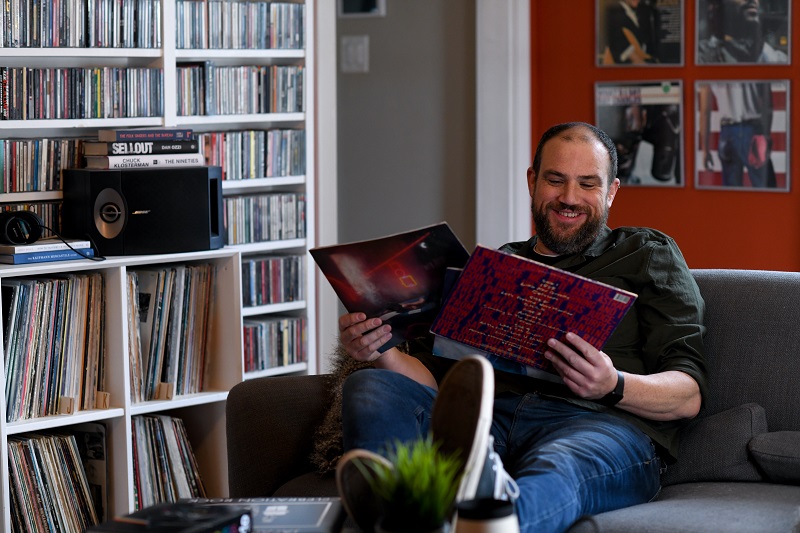Bariatric Surgery Uncovers a Fortunate Kidney Tumor Find

April 26, 2023
Matt Kleinschmidt knew gastric sleeve surgery would help him lose significant pounds and give him the energy to keep up with both his newborn son and his entertainment industry career working with bands and comedians. But he didn’t anticipate it would save his life in another way, too.
Alexander Abkin, M.D., medical director of Bariatric Surgery at JFK University Medical Center, who performed Matt’s surgery, explains that rapid weight loss can cause painful gallstones. “We have a standard protocol where we put patients on medication to reduce the risk of gallstones from 30 percent to 5 percent,” he says. “But to be on the safe side, we do an ultrasound of the right upper quadrant one year after surgery, where the gallbladder is, as well as the nearby liver and kidneys.”
Adds Matt: “It’s a wild story. I went for a one-year follow-up with Dr. Abkin right before the holidays, and the routine ultrasound they did to check my gallbladder found a mass on my kidney.”
Matt was referred to urologist Michael Lasser, M.D., director of robotic surgery at JFK, who confirmed the mass with a CT scan, then ordered an extensive workup with an oncologist, including a PET scan, a biopsy and other tests.
A Lucky Catch
While malignancy of the kidney is not rare, with about 80,000 cases diagnosed each year, the median age of diagnosis is 65, and Matt was closer to 40. “Only 6 percent of cases occur in men his age, so this was a lucky incidental finding,” says Dr. Lasser. “These days, 90 percent of kidney tumors are found incidentally before there are any symptoms, but it’s not common to find kidney cancer in a young man like Matt.”
Adds Dr. Abkin: “Had Matt not lost 193 pounds after bariatric surgery and returned for his one-year follow-up testing, who knows when his cancer might have been found. For Matt, sleeve gastrectomy wasn’t just life-altering but life-saving.”
In the months it took to determine the extent of disease and the best course of treatment, Matt was understandably anxious. But he says the demeanor of Dr. Lasser and his other doctors put him at ease.
“I didn’t yet think about how lucky I was that it was caught early while I was going through it,” Matt says. “But none of the doctors seemed panicked, which helped keep me calm, and Dr. Lasser was great at giving me very thorough and understandable explanations of everything.”
Doctors determined that the mass was stage T1A renal cell carcinoma, but had not spread to a suspicious-looking lymph node or elsewhere in Matt’s body. Dr. Lasser next performed a robotic partial nephrectomy.
“We partially removed Matt’s right kidney in July 2021, and his cancer is gone, with no additional treatment and no expectation it will come back," says Dr. Lasser. “Kidney cancer is a surgical disease, so it’s good to find it early and remove the tumor.”
A Fast Recovery
Matt says the recovery from the minimally invasive surgery was easy. “I had the surgery on a Wednesday and was back to work on Monday,” he says. “My scars are so small, you wouldn’t see them unless I pointed them out.”
Dr. Abkin says Matt’s newly smaller body made minimally invasive surgery possible. At his previous weight, he likely would not have been a candidate and would have had to endure the much-longer recovery of open surgery. “It’s a true success story as to what we as doctors can do and what patients can do to live their life to the fullest,” he says.
Today, Matt is worry- and cancer-free, and enjoys playing with his 3-year-old son, woodworking in his basement shop, and checking out the latest music, comedy acts and podcasts.
“If I’m not building something or playing with my kid, I’m talking about pop culture or watching or listening to it,” he says. “I’m not a fortune teller, so I have no idea what would have happened if the cancer was found 15 years from now. This thing could have been growing and spreading for a long time before we discovered it. In hindsight, I’m very lucky.”
Next Steps & Resources:
- Meet our sources: Michael Lasser, M.D., and Alexander Abkin, M.D.
- To make an appointment with a urologist near you, call 800-822-8905 or visit our website.
The material provided through HealthU is intended to be used as general information only and should not replace the advice of your physician. Always consult your physician for individual care.






